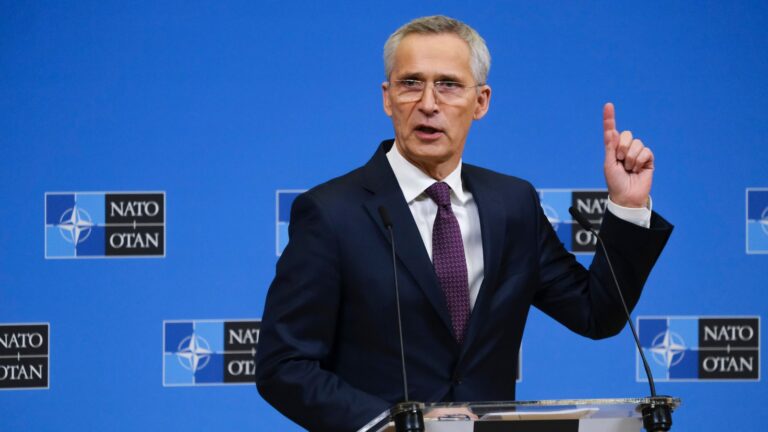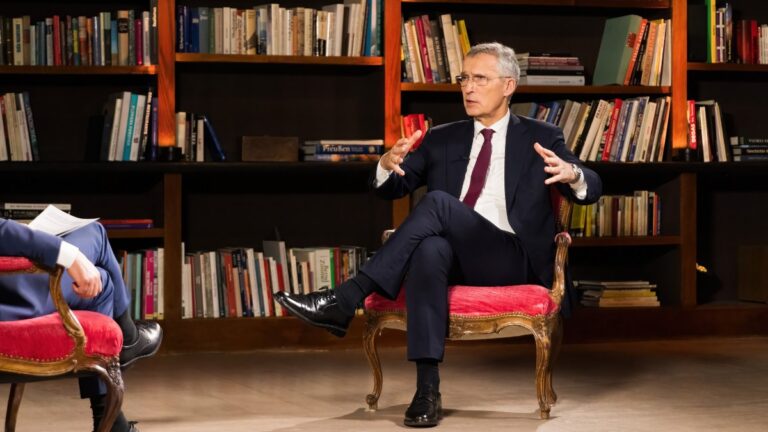Jens Stoltenberg has worn many hats: Prime Minister, NATO chief, and now Finance Minister. But there is more to his story than just titles.
From navigating political storms and shaping global security, to his dramatic return in Norwegian political life, his journey is packed with surprising twists.

So, what's behind his surprising resilience? Keep reading for some remarkable facts about one of Norway’s most prominent figures.
1. He got into politics really early
Jens Stoltenberg’s first contact with political action came in his early teens, thanks to his sister Camilla, who was part of Marxist–Leninist group Red Youth at the time.
The group opposed the Vietnam War, especially after the intense bombing raids that hit the North Vietnamese city of Hai Phong.
Jens didn't just watch from the sidelines: he joined protest marches right up to the doors of the US Embassy in Oslo. Things got heated; protesters even threw stones, breaking a few embassy windows.
Jens himself avoided arrest, but several of his friends weren't so lucky.
2. He was prime minister twice–with a twist
Jens Stoltenberg's journey as Norway's Prime Minister had its ups and downs. His first stint, starting in March 2000, was brief. It lasted just over a year.
His push for liberal economic reforms, including privatising government-owned enterprises and restructuring public services, didn't sit well with many Norwegians.
This led to a significant loss for his Labour Party in the 2001 elections, marking one of their worst performances since World War II.
But Jens wasn't done yet. Learning from his mistakes, he orchestrated a comeback in 2005. This time, he formed a coalition with the Socialist Left Party (SV) and the Centre Party (SP), creating what's known as the Red-Green Coalition.
This alliance resonated with voters, leading to a majority government that held strong until 2013.
Among the main achievements of Stoltenberg’s second stint as prime minister (2005–2013) were maintaining low unemployment, steering Norway steadily through the global financial crisis, and expanding social services.
His government also increased defense spending and resolved a long-standing maritime border dispute with Russia in the Barents Sea.
3. He called for unity at a time of national tragedy
On July 22, 2011, Norway experienced its worst massacre on home soil since World War II.
In the chaos following the terror attacks in Oslo and on the island of Utøya, as Norwegians filled streets with flowers and messages of love and defiance, Jens Stoltenberg emerged as a calm and steadying voice.
His composed leadership helped unite a grieving nation at a moment of profound shock.
Instead of responding with anger or fear, Stoltenberg famously urged Norwegians to embrace “more democracy, more openness, and more humanity, but never naïvete.”

Stoltenberg’s measured words set a tone of resilience, compassion, and solidarity that helped guide Norway through its worst tragedy since the occupation. His response drew international praise for its emphasis on unity over division.
4. He was NATO's Secretary General for 10 years
In 2014, Jens Stoltenberg took on the role of Secretary General of NATO, succeeding former Danish Prime Minister Anders Fogh Rasmussen.
His appointment reflected his extensive political experience, strong diplomatic ties with key NATO member states, and his reputation as a steady leader with a firm stance on defense and security.
While the position typically involves a fixed term, Stoltenberg’s mandate has been extended several times.
One of those extensions came in 2022, shortly after Russia's invasion of Ukraine, when NATO leaders asked him to stay on to ensure continuity during a period of heightened tension in Europe.
Stoltenberg’s leadership at NATO has been marked by efforts to strengthen the alliance’s defenses, improve cooperation between member states, and respond to emerging security threats.
He stepped down on 1 October, 2024, after a decade in the role.
5. He recently made a shock return to Norwegian politics
Shortly after Stoltenberg’s departure from NATO, it was announced that he would become the next Chairman of the Munich Security Conference, in February 2025. Events on the national political stage would soon disturb those plans, however.
In January 2025, the Centre Party (SP) unexpectedly withdrew from the governing coalition. The split was due to disagreements over adopting European Union energy policies, particularly concerning the integration of EU energy market rules.
This departure meant that several SP ministers left their posts, including the Finance Minister, SP leader Trygve Slagsvold Vedum. In a surprising move, Prime Minister Jonas Gahr Støre appointed Jens Stoltenberg to fill the role of Finance Minister.
Stoltenberg accepted, stating: “I am deeply honoured to have been asked to help my country at this critical stage.” About his role at the Munich Security Conference, Stoltenberg said that he would resume that position once his public service concluded.
The combination of the coalition's breakup and Stoltenberg's return helped catapult the Labour Party from trailing in the polls to taking the lead. In the first three months of the year, AP surged about 10 points in the polls, overtaking both of the main opposition parties.
6. He comes from a family that is used to the spotlight
Jens Stoltenberg didn't stumble into public life by chance; in many ways, it's the family business. His father, Thorvald Stoltenberg, was a prominent figure in Norwegian politics, serving as both Minister of Defense and Foreign Affairs.
Known for his warmth and humanitarian efforts, Thorvald was especially recognised for advocating refugee rights and progressive drug policy reform. His mother, Karin Stoltenberg, dedicated her career to women's rights and family policy, shaping Norwegian social policies for decades.
Even his siblings have made their mark. Jens's sister, Camilla Stoltenberg, gained widespread recognition as director-general of the Norwegian Institute of Public Health, guiding Norwegians through the COVID-19 pandemic.
Growing up in this environment, political and social debates were common around the Stoltenberg dinner table. These lively discussions undoubtedly shaped Jens's ability to communicate clearly and confidently, skills that would prove useful in his political career.
7. He drove a taxi to hear what voters really thought
During the 2013 election campaign, Jens Stoltenberg did something most politicians wouldn't dream of: he got behind the wheel of a taxi.
With hidden cameras rolling, the then-Prime Minister drove passengers around the Norwegian capital, chatting casually about politics and everyday life.
His goal was to listen in on the honest, unfiltered thoughts of Norwegian voters… and no doubt, to generate a buzz for his campaign. Some passengers recognised him right away; others had no idea they were chatting with the nation's leader.
Either way, the stunt quickly went viral, sparking plenty of laughter and conversation across the country. So, next time your taxi driver starts discussing politics, take a good look at his face, you never know who might be behind the wheel!

